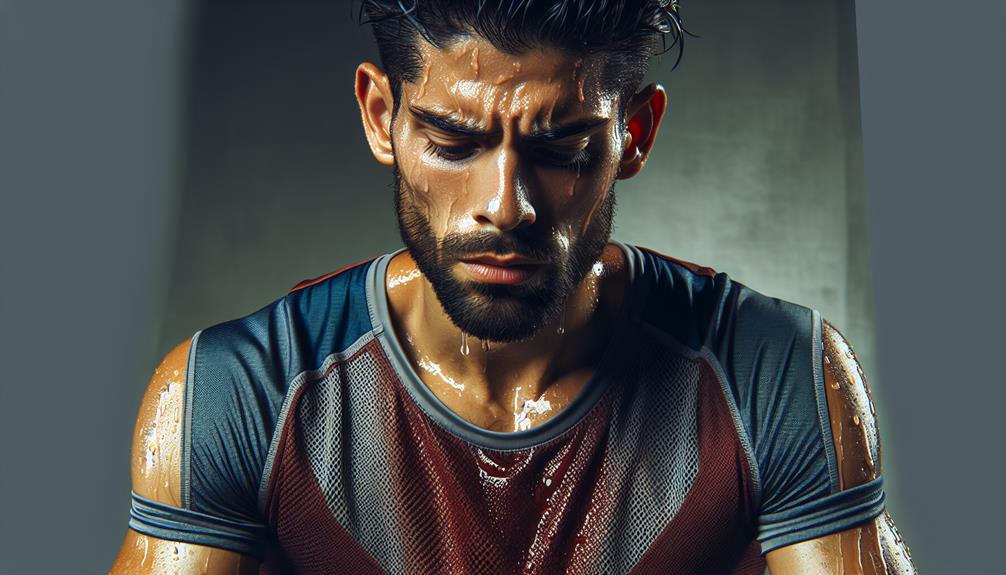Polyester can make me feel like I'm wrapped in a sauna due to its low breathability and moisture-wicking limitations. When compared to cotton, polyester struggles with sweat retention, trapping moisture against the skin. While it does have quick-drying capabilities, it might not be the best choice for managing sweat effectively. Opting for materials like cotton, known for its absorbent nature, could be a better option to stay comfortable during workouts. Keep in mind that different fabric blends and treatments can influence sweat management.
Table of Contents
Key Takeaways
- Polyester has minimal moisture absorption, making it less effective for managing sweat.
- Polyester's hydrophobic nature traps sweat on the skin, causing discomfort.
- Polyester's breathability is poor, hindering effective sweat regulation.
- Cotton outperforms polyester in sweat management due to its absorbent nature.
- Opting for moisture-absorbing materials like cotton is recommended over polyester for better sweat control.
Polyesters Moisture-Wicking Properties
While polyester is known for its durability and quick-drying nature, its effectiveness at wicking away sweat may not match that of natural fibers like cotton and wool. Polyester, being a hydrophobic fabric with low moisture absorbency, lacks the innate ability to manage sweat efficiently.
To compensate for this drawback, manufacturers often chemically treat polyester to enhance its moisture-wicking properties. However, even with these treatments, polyester may still not perform as well as natural fabrics when it comes to managing sweat during physical activities.
Factors such as fabric construction and blends with other fibers like spandex can influence the moisture-wicking abilities of polyester. So, while polyester is great for durability and drying quickly, individuals seeking superior sweat-wicking properties in their clothing may find that natural fabrics like cotton and wool outperform polyester in this aspect.
Sweat Retention Comparison: Polyester Vs. Cotton
Polyester's moisture-wicking limitations lead to sweat retention issues compared to the superior breathability and moisture-absorbing properties of cotton. When it comes to managing sweat, cotton outperforms synthetic fabrics like polyester. Cotton is a natural fiber that allows for better airflow, helping sweat to evaporate quickly and keeping you feeling dry.
On the other hand, polyester tends to trap moisture against the skin, leading to sweat marks and discomfort, especially during physical activities. The absorbent nature of cotton makes it a preferred choice for sweat-wicking fabrics over synthetic materials like polyester.
Benefits of Polyester for Sweat Management
Polyester offers excellent moisture-wicking properties, actively pulling sweat away from the skin. Its quick-drying capabilities guarantee that sweat evaporates quickly, keeping me comfortable and dry during intense workouts.
These features make polyester a go-to choice for managing sweat effectively during physical activities.
Moisture-Wicking Properties
With its moisture-wicking properties, polyester effectively draws sweat away from the skin, making it a top choice for managing perspiration during physical activities. Polyester fabric excels at keeping you dry and comfortable during workouts due to its sweat-wicking capabilities. Here are three benefits of polyester for sweat management:
- Efficient Moisture Control: Polyester efficiently wicks away sweat from the skin, keeping you dry and comfortable.
- Reduced Discomfort: By preventing sweat accumulation on the skin, polyester reduces discomfort during physical activities.
- Ideal for Active Lifestyles: Polyester's moisture-wicking properties make it a popular choice for sportswear and activewear designed for active lifestyles.
Quick-Drying Capabilities
Boasting remarkable quick-drying capabilities, polyester emerges as a standout choice for effectively managing sweat during physical activities. Polyester's moisture-wicking properties efficiently draw sweat away from the skin, keeping the body dry and comfortable. Compared to natural fibers like cotton, polyester fabric dries much faster, preventing moisture buildup and reducing discomfort. The quick-drying nature of polyester is especially beneficial in sportswear and activewear designed for intense workouts, where staying dry is essential for performance and comfort.
| Quick-Drying Capabilities | ||
|---|---|---|
| Efficiently draws sweat away from the skin | Dries faster than cotton | Prevents moisture buildup |
| Reduces discomfort from sweat | Popular choice for sportswear | Ensures comfort during intense workouts |
Blending Polyester for Enhanced Sweat-Wicking
Blending different fibers with polyester can greatly enhance the sweat-wicking performance of clothing. When it comes to creating garments that effectively manage sweat, polyester blends offer a variety of advantages:
- Improved Moisture-Wicking Properties: Combining polyester with hydrophilic fibers can notably boost the sweat-wicking capabilities of the fabric. This blend helps draw moisture away from the skin, keeping you dry and comfortable during physical activities.
- Moderate Sweat-Wicking Abilities: Polyester blends with spandex or nylon provide moderate sweat-wicking abilities, making them suitable for a range of athletic and casual wear. These blends strike a balance between comfort and performance.
- Dual-Layer Design for Enhanced Performance: Some sweat-wicking clothes feature dual layers using polyester. This design creates a push/pull effect, where the inner layer absorbs sweat while the outer layer helps to evaporate it quickly, enhancing overall moisture management.
Chemical Treatments for Improved Sweat Absorption
I've found that chemical treatments play a key role in enhancing polyester's sweat absorption capabilities.
These treatments can greatly improve the fabric's ability to manage moisture during workouts.
The use of chemical treatments on polyester fabrics provides a practical solution for keeping the body dry and comfortable during intense exercise sessions.
Enhanced Sweat Absorption
Chemical treatments can enhance polyester's sweat absorption capabilities, making it more effective at wicking moisture during physical activities. This enhancement is vital for keeping you comfortable and dry when working up a sweat.
Here are three ways these treatments benefit sweat absorption in polyester:
- Increased Moisture-Wicking: Chemically treated polyester pulls sweat away from your skin, allowing it to evaporate more quickly.
- Reduced Clinging: The enhanced sweat absorption properties help prevent that uncomfortable clingy feeling often experienced during intense workouts.
- Improved Breathability: By absorbing sweat efficiently, treated polyester allows for better ventilation, keeping you cool and comfortable.
With these enhancements, chemically treated polyester is a top choice for sweat-wicking athletic wear.
Fabric Treatment Options
When treating polyester fabrics for improved sweat absorption, various chemical options can greatly enhance their moisture-wicking capabilities. Chemical treatments on polyester fabrics are designed to improve their sweat absorption, making them more effective during physical activities. These treatments help keep the body dry and comfortable during workouts by preventing discomfort and moisture buildup. Here's a table to illustrate some common fabric treatment options for enhancing sweat absorption in polyester materials:
| Fabric Treatment | Description |
|---|---|
| Moisture-wicking finish | Coating that helps sweat evaporate quickly |
| Anti-microbial treatment | Prevents odor-causing bacteria growth |
| Hydrophilic chemicals | Attract moisture to enhance absorption |
| Quick-dry technology | Speeds up the evaporation process |
| Mesh panels | Provide ventilation for improved airflow |
Polyester Vs. Natural Fibers in Sweat Control
In managing sweat, natural fibers like cotton outperform polyester due to their superior breathability and absorbency. When it comes to sweat control, opting for natural fabrics can make a significant difference. Here's why:
- Breathable Fabrics: Natural fibers such as cotton allow for better airflow, helping to keep you cool and dry during physical activities.
- Moisture Absorbency: Cotton has a higher moisture absorbency rate compared to polyester, which means it can effectively wick away sweat from your skin.
- Comfort and Skin Health: Choosing natural fibers over polyester can lead to better overall comfort, reduced risk of skin irritation, and improved skin health due to their breathable nature.
Polyesters Breathability and Sweat Regulation
Polyester's lack of breathability can hinder its ability to effectively regulate sweat, potentially leading to discomfort during physical activities. Unlike natural fibers that can absorb moisture, polyester is moisture-resistant and tends to trap heat and sweat against the skin. This lack of breathability means that sweat lingers on the skin rather than being absorbed and evaporated, which can contribute to a feeling of stickiness and discomfort during sweating episodes.
To illustrate the differences between polyester and natural fibers in sweat regulation, let's take a closer look at how they compare:
| Aspect | Polyester | Natural Fibers |
|---|---|---|
| Moisture Absorption | Low | High |
| Breathability | Poor | Good |
| Sweat Regulation | Ineffective | Effective |
This table underscores how polyester's fabric properties make it less suitable for managing sweat compared to natural fibers. When choosing activewear for sweat-prone situations, considering the fabric's breathability and moisture absorption capabilities is vital for ensuring comfort and performance.
Polyester Fabric for Sweat-Proof Activewear
Polyester fabric excels in sweat-proof activewear due to its exceptional moisture-wicking properties. When it comes to intense workouts and managing sweat, polyester is a top choice. Here's why:
- Moisture-Wicking: Polyester fabric swiftly draws moisture away from the skin, keeping you dry even during the toughest workouts.
- Quick Drying: Its ability to dry rapidly is perfect for activities where you work up a sweat, ensuring you stay comfortable and focused.
- Enhanced Performance: By preventing the buildup of sweat and moisture, polyester activewear helps improve your overall performance by keeping distractions at bay.
Polyester: The Verdict on Sweat Absorption
Exhibiting a minimal moisture absorption rate of just 0.4%, polyester fabric presents challenges in effectively managing sweat during physical activities. This hydrophobic material tends to repel water, trapping sweat on your skin instead of absorbing it. This limitation makes polyester less than ideal for handling sweat, potentially leading to discomfort and skin irritations.
When it comes to sweat control, polyester falls short compared to natural fabrics like cotton or bamboo, which excel at soaking up moisture and keeping you dry. So, if you're looking to stay comfortable and sweat-free during your workouts or adventures, opting for cotton or other moisture-absorbing materials might be a better choice than polyester.
Frequently Asked Questions
Is It Bad to Sweat in Polyester?
Sweating in polyester can be uncomfortable because it doesn't absorb moisture well, leading to potential odor and skin irritation. The fabric traps heat and sweat, making physical activities less enjoyable. It's not the best choice for sweat.
What Is the Best Fabric for Sweating?
For sweating, I recommend cotton, bamboo, linen, merino wool, and rayon. Each fabric offers breathability, moisture absorption, and comfort during physical activities. Finding the right fabric can help manage sweat effectively while keeping you dry and comfortable.
Does 100% Polyester Make You Hot?
Wearing 100% polyester can make me feel hot and uncomfortable. The fabric doesn't breathe well, trapping heat and moisture, leading to overheating and sweat accumulation. Opting for natural fabrics like cotton or linen helps me stay cool and comfortable.
Is It Better to Exercise in Cotton or Polyester?
For exercise, I prefer polyester over cotton due to its moisture-wicking properties. Polyester keeps me dry and comfortable during intense workouts. The choice between polyester and cotton ultimately depends on personal preference and workout intensity.
- The Use of Nonwovens in Construction and Civil Engineering - July 11, 2025
- The Use of Nonwovens in Construction and Civil Engineering - July 11, 2025
- The Use of Nonwovens in Construction and Civil Engineering - July 11, 2025






